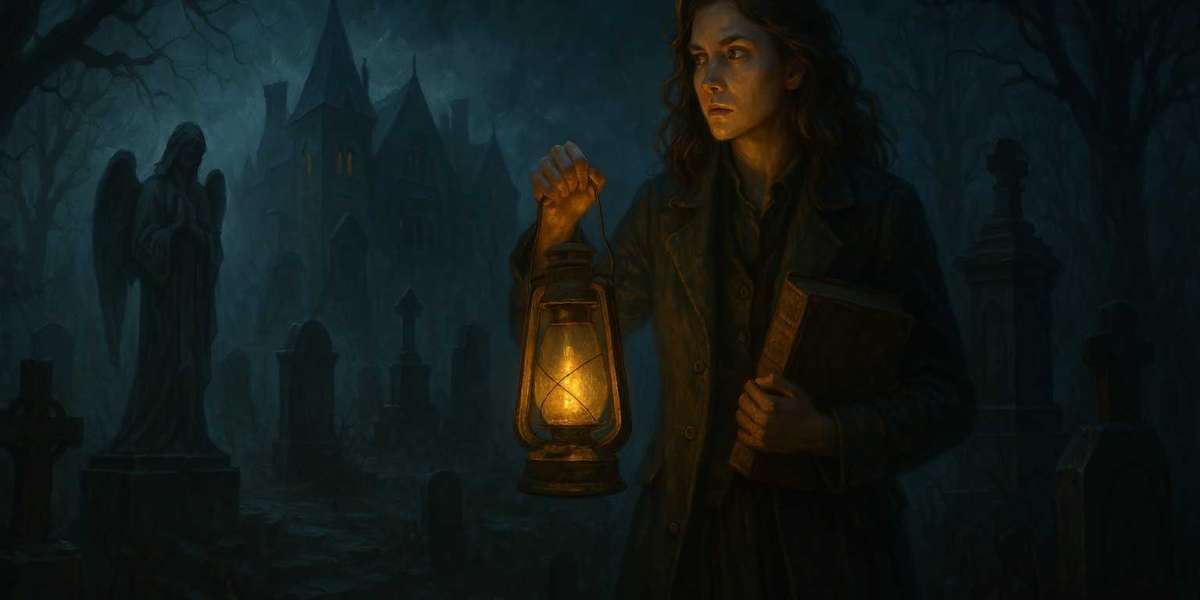The Inheritance Letter
Chapter 3: The Collector's Legacy
The stone steps descended in a tight spiral, forcing Eliza to keep one hand against the damp wall for balance. Her phone's flashlight cast wild, jumping shadows as she moved deeper beneath the manor. The air grew colder with each step, carrying an earthy scent tinged with something she couldn't quite identify—something like old leather and metal polish and dried flowers, all mingled together.
The scratching sound had stopped, but the silence that replaced it felt watchful, as if the darkness itself were holding its breath. Twice Eliza paused, certain she heard soft footfalls behind her, only to turn and find nothing but empty stairwell fading into blackness.
After what seemed like far too many steps for a mere basement, the staircase ended at a heavy wooden door bound with iron. No handle, no lock—just a small metal plate at eye level. Eliza ran her fingers over it, feeling etched symbols similar to those on the key her grandmother had sent.
On impulse, she pressed the key against the plate. It adhered as if magnetized, and the door swung inward with a sigh of displaced air.
Eliza hesitated at the threshold. Every instinct warned her to turn back, to retreat to the relative safety of the manor above. But the mystery of what her grandmother had hidden pulled at her more strongly than fear.
She stepped through the doorway.
Her flashlight beam seemed swallowed by the vastness beyond. Eliza swept it across the space, struggling to make sense of what she was seeing. The room was enormous—far larger than should have been possible given the footprint of the manor above. Its ceiling disappeared into shadow despite her light, and its perimeter stretched beyond the beam's reach in all directions.
But it was what filled the space that stole her breath.
Shelves. Hundreds of shelves arranged in concentric circles around a central pedestal. And on those shelves, illuminated one by one as she panned her light across them, were thousands of objects—each one meticulously labeled and displayed as in a museum.
Eliza moved forward cautiously, examining the nearest shelf. A child's teddy bear, worn with love and age, sat beside a small card reading "Timothy Wells, age 7, 1922." Next to it, a tarnished pocket watch: "Harold Finch, age 43, 1896." A pair of wire-rimmed spectacles: "Martha Crenshaw, age 68, 1911."
More shelves, more objects. A wedding ring. A fountain pen. A set of military medals. A hand-painted tea cup. A violin bow. A book of poetry with a pressed flower between its pages.
Some items appeared mundane—a baseball, a set of keys, a hairbrush, a gardening trowel—while others unsettled her deeply: a jar containing what looked like human teeth, a necklace that appeared to be made from hair, a book bound in what she prayed wasn't human skin.
Each item meticulously labeled with a name, an age, and a date.
Her light caught something gleaming in a glass case—a collection of small crystalline vials, each containing what appeared to be a single tear. The label read "Various subjects, collected 1905-1927."
"What is this place?" Eliza whispered, her voice absorbed by the watching darkness.
As if in answer, lights began to flicker to life around the perimeter of the room—old-fashioned gas lamps that shouldn't have been functional but nonetheless cast a warm, golden glow that expanded until the entire chamber was illuminated.
Now Eliza could see the true scale of the collection. The room was circular, its walls lined with shelves that reached from floor to ceiling. The concentric rings of display cases created a labyrinth leading to the center, where a stone pedestal held a massive leather-bound book.
And the collection—it was vaster than she'd first thought. Thousands upon thousands of objects spanning what must have been centuries, each one tagged and cataloged. Some displays were ornate, with velvet cushions and glass cases. Others were simpler—plain wooden boxes or metal trays.
But all bore those simple labels: a name, an age, a date.
Drawn as if by an invisible current, Eliza made her way toward the central pedestal and the book it held. Along the way, she passed more disturbing items: a collection of preserved hearts in ornate boxes, a series of small vials labeled "Last Breath," a crystal bowl filled with what appeared to be fingernail clippings.
The pedestal stood in a circular clearing at the very center of the room. The book upon it lay open, its pages yellowed with age, the text handwritten in various styles as if maintained by different record-keepers over the years.
It was a ledger.
Each page contained entries with the same format: a name, a description of an item, a date of collection, and a notation labeled "payment." Some of the entries were centuries old, the ink faded almost to invisibility. Others were more recent, including several from the 1990s that Eliza realized with a shock were in her grandmother's handwriting.
She turned to the most recent page and felt her blood freeze.
The final entry, dated just days before her grandmother's death, read: "Collection transferred to Elizabeth Jane Finch. Payment due at the next full moon."
Next to this was a description of the item to be collected: "Silver pocket watch, belonging to Judge William Hammond, containing photograph of deceased wife."
Eliza's hands trembled as she stared at her name in the ancient book. What had her grandmother done? What did it mean that the "collection" had been transferred to her?
"She tried to break the contract, you know."
The voice, soft and sibilant, came from directly behind her. Eliza whirled around, nearly stumbling against the pedestal.
A figure stood in the shadows just beyond the circle of light. Tall—impossibly tall—and thin to the point of emaciation, it was draped in what appeared to be a cloak of feathers that shifted between deep blue and black as it moved. Its face remained in shadow, but Eliza could make out the gleam of eyes watching her with unblinking intensity.
"Who are you?" she managed, her voice barely a whisper.
"I have been called many things over the centuries," the figure replied. "To the first Ravenscroft, I was Corvus. That name has served well enough since."
The figure—Corvus—took a step forward into the light. Eliza gasped. What she had taken for a feathered cloak was actually part of the being itself—a mantle of glossy raven feathers that grew from its shoulders and back. Its face was unnaturally elongated, skin stretched tight over sharp cheekbones, its eyes entirely black save for pinpoints of white light at their centers.
"What are you?" Eliza amended her question, fighting the urge to flee.
"A patron. A benefactor. A collector of... let us call them 'emotional artifacts.'" Corvus gestured with a too-long hand toward the countless shelves. "Every object here contains a fragment of its former owner's soul—a piece given unwillingly when something deeply cherished is taken."
Eliza thought of the labels—names, ages, dates. Thousands of people throughout the centuries who had lost something precious to them.
"And my family? What role did they play in this?"
Corvus's mouth stretched in what might have been intended as a smile, revealing teeth too numerous and too sharp. "The Ravenscrofts were facing ruin in 1788—debts, disease, disgrace. The patriarch sought my assistance. I offered a bargain: prosperity, health, and social standing for his family, in exchange for their service as my collectors."
The being moved around the pedestal in a motion too fluid to be natural, its feathers rustling softly. "For generations, the Ravenscrofts and their descendants have identified suitable candidates and retrieved items of deep emotional significance for my collection. In return, they have enjoyed wealth, longevity, and influence."
"My grandmother..." Eliza began.
"Eleanor was a reluctant collector," Corvus interrupted. "She performed her duties, but always sought a way out of the family obligation. When she discovered she was dying, she made one final, desperate attempt to break the contract."
The creature's eyes flashed. "She transferred the collector's duty to you, believing you might succeed where she had failed. Clever, but ultimately futile. The contract binds the bloodline, not the individual."
Eliza's mind raced. "The letter. The inheritance. That's what she meant by 'some inheritances come with prices.'"
"Indeed." Corvus glided closer. "You are now the collector, Elizabeth Finch. The next item must be acquired by the full moon—three days from now. Judge Hammond's pocket watch, containing the last image of his beloved wife. He keeps it with him always, a touching reminder of mortal love."
"And if I refuse?"
The temperature in the room plummeted. Corvus's form seemed to expand, shadows deepening around it, feathers bristling.
"Then the price falls due in another way," it hissed. "The contract must be honored. If not through collection, then through forfeit."
"Forfeit of what?"
"The collector's own most treasured possession—their life."
Eliza stepped back, bumping against the pedestal. "You're saying I have to steal a grieving man's memento of his wife, or die?"
"Put so crudely, yes." Corvus's form settled, returning to its previous state. "Though 'steal' is such an inadequate word for the artistry involved. The taking must be done in a specific way, with specific intentions. The object must be recognized for its emotional value, acknowledged as irreplaceable, and then taken with full awareness of the pain its loss will cause. Only then does it attain the... quality... I require."
Eliza felt sick. This was what her family had been doing for generations? Deliberately causing pain to feed this creature's collection?
"My grandmother wouldn't have been part of this," she insisted. "She was kind, generous."
"Eleanor performed her duties," Corvus repeated. "Though with increasing reluctance as the years passed. The entries in her handwriting number fewer than her predecessors. She sought loopholes, delays. But in the end, she always collected."
The being gestured toward a shelf nearby. "Her final collection, just last year. A music box belonging to a child in foster care—the only memento of his birth mother."
Eliza's eyes widened as she recognized the delicate tune that had been haunting the manor—the same melody that had drawn her to the hidden staircase.
"I won't do it," she said, her voice stronger now despite her fear. "I won't hurt someone for your... feeding."
Corvus tilted its head at an impossible angle. "You have three days to reconsider, collector. The full moon rises on the third night. Fulfill your inherited duty, or pay the forfeit."
With that, the gas lamps around the chamber began to extinguish one by one, plunging the space back into darkness. Eliza fumbled for her phone, activating the flashlight just in time to see Corvus's form dissolving into a swirl of feathers and shadow that rushed past her like a cold wind, heading toward the staircase.
Alone in the vast collection room, Eliza sank to her knees beside the pedestal, her mind reeling with everything she'd learned. Her family legacy wasn't the grand house, the ancestral name, or even the obvious wealth that had maintained this estate for generations. It was this—a contract with something inhuman, an obligation to cause suffering in exchange for prosperity.
Her grandmother had tried to find a way out and, failing that, had passed the burden to Eliza in a desperate gamble that her granddaughter might succeed where she had failed.
But how? How could she possibly break a contract that had bound her family for over two centuries?
Eliza's light caught the ledger, still open to the page with her name. Below the entry about Judge Hammond's pocket watch was a notation she hadn't noticed before, written in her grandmother's hand:
"The contract binds until death or until payment is made in full. One who gives freely what another would take unwillingly might break the chain."
A riddle. A clue. Perhaps her grandmother's final attempt to help her.
Sounds from above reached her—footsteps moving through the manor. Heavy, purposeful steps that were neither Thaddeus's halting gait nor Corvus's inhuman glide.
Eliza rose shakily to her feet. She needed to get back upstairs, to think, to plan. Three days until the full moon. Three days to either find a way to break her family's contract with Corvus or to commit an act of deliberate cruelty against an innocent man.
Or die.
She hurried toward the staircase, the beam of her flashlight bouncing wildly across shelves of stolen treasures—generations of pain and loss packed into glass cases and wooden boxes. At the foot of the stairs, she paused, turning to look back at the vast collection chamber one last time.
"I'm sorry," she whispered, an apology to the thousands of names on the labels, to all those who had suffered for her family's prosperity.
Then she began her ascent, the iron key heavy in her pocket, the weight of her inheritance heavier still on her shoulders.
By the time she reached the hidden door behind the library bookcase, the storm outside had intensified. Thunder shook the manor, and lightning flashed through the windows in rapid succession. Eliza pushed the bookcase open cautiously, peering into the library beyond.
Empty. But a fire blazed in the hearth that had been cold when she descended, and several books lay open on the desk that had been clear before.
Someone had been there while she was below.
Moving quietly, Eliza slipped into the library and closed the secret passage behind her. The house felt different now, the shadows deeper, the silence more watchful. What had seemed merely gothic and mysterious before now felt dangerous, tainted by the knowledge of what lay beneath.
She needed to find Thaddeus. The caretaker clearly knew more than he had revealed. If anyone could help her understand her options, it would be him.
Eliza made her way to the foyer, intending to brave the storm and look for the caretaker's cottage Thaddeus had mentioned. But as she reached for the front door, a voice stopped her.
"There's no need to go out in this weather, Miss Finch."
She turned to find Thaddeus standing at the foot of the grand staircase, looking even more frail than before, his face grave.
"You've been to the collection room," he said. It wasn't a question.
"Yes." Eliza approached him, anger rising. "You knew. All this time, you knew what my family was doing."
"I did." Thaddeus didn't flinch from her accusation. "I have served the Ravenscroft estate for nearly five decades. I have watched three generations of collectors fulfill their duties."
"Including my grandmother."
"Eleanor was... different." A hint of something like affection crossed the old man's face. "She performed her role, but never without regret. She spent years researching ways to break the contract."
"Did she find anything?"
Thaddeus hesitated. "Perhaps. But before we discuss such matters, you should know that Corvus is not the only visitor to the manor tonight."
He gestured toward the sitting room, where a light now shone beneath the door that Eliza was certain had been dark earlier.
"Who else is here?" she whispered.
"Judge Hammond," Thaddeus replied, his voice equally low. "He arrived shortly after you descended to the collection room. He claims he received an anonymous note suggesting that answers about his wife's death might be found at Ravenscroft Manor."
Eliza felt cold dread pool in her stomach. "Corvus. It's trying to force my hand by bringing him here."
"So it would seem." Thaddeus leaned heavily on his cane. "The master—forgive me, the creature—grows impatient when a new collector hesitates."
A flash of lightning threw their shadows sharp against the wall, followed immediately by a deafening crack of thunder that made the chandelier sway overhead. The manor's lights flickered, dimmed, and then went out completely, plunging them into darkness broken only by the occasional flash of lightning through the windows.
"It wants you to meet the judge," Thaddeus said softly. "To see the pocket watch. To feel tempted."
Eliza activated her phone's flashlight again, illuminating the caretaker's grim expression. "I'm not going to play its game. I need answers, Thaddeus. What was my grandmother trying to tell me in the ledger? What did she mean about someone giving freely what another would take unwillingly?"
Before he could answer, the sitting room door opened, and a man's silhouette appeared against the faint glow of what must have been the fireplace beyond.
"Is someone there?" called a deep voice. "The power seems to be out."
Eliza glanced at Thaddeus, who gave a slight nod. "Remember," he murmured, "Everything in this house serves Corvus's purpose until proven otherwise."
With that cryptic warning, he turned and vanished into the shadows of the hallway, leaving Eliza alone in the foyer facing the man who unknowingly held the item she was supposed to steal—and whose suffering would feed an inhuman collection if she complied.
"Yes," she called back, steadying her voice. "I'm Eliza Finch, the owner. Just a storm outage, I think. The backup generator should kick in soon."
She approached the sitting room doorway, her light revealing a tall man in his sixties, silver-haired and distinguished despite his rain-dampened clothes. He extended a hand.
"William Hammond. I apologize for the intrusion at this hour, but I received a rather unusual message concerning this property."
As they shook hands, Eliza noticed the chain of a pocket watch extending from his vest pocket—the very watch she was meant to take, containing the last photograph of his wife.
Three days until the full moon. Three days to find a solution.
Or be forced to choose between becoming a thief of cherished memories or surrendering her own life to an ancient, terrible contract.








